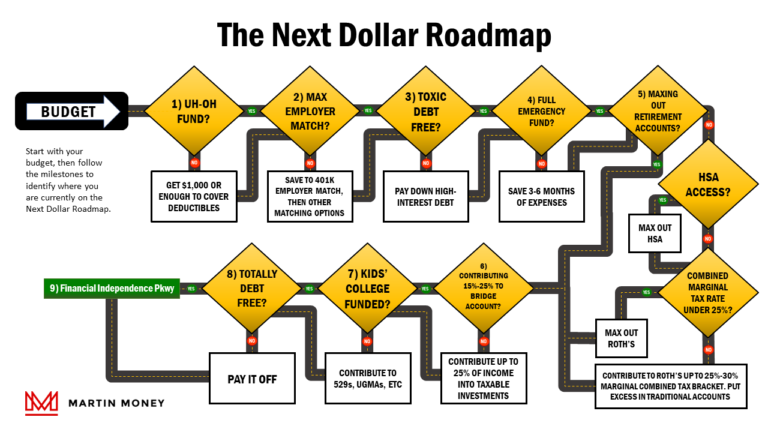Milestone 8: Pay Off Remaining Debt
At this point, you will have completed milestones 1 through 7 on our Next Dollar Roadmap and you’re in a comfortable financial place:
- Starting Point: Creating Your First Budget
- Milestone 1: The Uh-Oh Fund
- Milestone 2: Take Advantage of Your Employer Match
- Milestone 3: Pay Off Toxic Debt
- Milestone 4: Fully Funded Emergency Fund
- Milestone 5: Save 15%-25% of Your Income in Tax-Advantaged Retirement Accounts
- Milestone 6: Invest for Flexibility
- Milestone 7: Prefund Kids’ Expenses
- Milestone 8: Pay Off Any Remaining Debt
- Milestone 9: Total Financial Independence
Milestone 3 calls for us to pay off “toxic” debt which we characterized as just about everything short of low-interest debts like mortgages or student loans.
Once again, the roadmap has been set up for the optimal financial series of decisions, but there are exceptions.
At this point, you’ve earned a lot of flexibility in your planning. Don’t be afraid to arrange milestones 6 through 8 in a way that best suits you.
In this post, we’ll go through the pros and cons of paying off your mortgage early. Hopefully, you’ll read this with an open mind and it’ll get you thinking about the house in a way you haven’t before. Let’s dive in!
Common Reasons Not to Pay Off the Mortgage:
1) Arbitrage
If you have a favorable interest rate on your loan, you may be asking yourself why you’d be in a hurry to pay it down.
After all, the difference between returns you’re able to pull in through investing and the interest rate on your debts provides an arbitrage opportunity.
Here’s what we mean.
Let’s assume Harry Homeowner has $100,000 left on his mortgage at an annual interest rate of 3%. In May, Harry directs $5,000 toward his mortgage in addition to the regular monthly payment.
As a result, Harry will cumulatively save $150 ($5,000 x 3%) every year for the remainder of his mortgage.
But what if Harry directs that same $5,000 into a brokerage account returning 8% annually? In one year, Harry will make $400 on the same money he could have directed into his mortgage.
The $400 gain will eventually be subject to a capital gains tax of up to 20% ($80 in this case), but Harry still comes out better mathematically than he would have by directing the extra cash to his debt.
Even at 20% tax, he nets $170 ($400 – $80 – $150).
The problem with this example is that you don’t know what market returns will be in a given year. You might lose some of your investment, making the mortgage a better way to go.
If bond or fixed-income rates are high enough, you may be able to secure your arbitrage opportunity. But, it’s not often the difference would be high enough to justify the effort.
2) Cashflow
If you followed the guidance back at Milestone 4, you shouldn’t be in the position of needing cash.
With that said, it’s hard to spend the equity in your house without taking on yet another loan (which you’re not going to do, right?).
In the months leading up to my layoff from work in 2015, we had directed several thousand dollars toward paying off mortgage debt at a 3.5% interest rate.
Even though we had our emergency fund filled I felt pretty dumb driving home from my former office with no income, the same monthly mortgage payment due, but slightly less debt than I would have had otherwise.
At that moment, liquid cash was my top priority.
If cash is tight, you probably won’t be tempted to pay off the mortgage early, but if you get the itch, take a u-turn back to Milestone 4 and get things in proper order.
3) The Tax Break
We should probably actually put this one in the “Reasons to Pay Off the Mortgage” section, but it shocks me how often we hear this as a justification to keep debt.
Yes, you do get a tax deduction for mortgage interest, assuming your deductions exceed the standard deduction and you are itemizing.
However, keeping a mortgage for the honor of having a deduction is pennywise and pound-foolish.
Let’s look at the math.
Assume you pay $5,000 in mortgage interest in a given year and are firmly in the 22% tax bracket. Your deduction is worth $1,100 in reduced taxes owed. Congratulations.
The problem is you paid $5,000 to your loan holder to get $1,100 back from Uncle Sam.
Not sure about you, but where I come from that’s a bad deal.
By the way, that $5,000 is interest, not equity, so it doesn’t gain anything of value for you to pay it.
Common Reasons to Pay Off the Mortgage:
1) Your High Interest Rate
We’re writing this in 2022, so it sounds a bit farfetched at the moment, but interest rates are on the rise.
If you find yourself in a mortgage that has a high interest rate with no option to refinance in sight, you may want to start paying it off.
We’ll give you much of this is unlikely, but if you are in an adjustable-rate loan or some other less traditional mortgage product it’s very possible.
2) You’re retiring soon
If you have a low-interest rate mortgage and are struggling with a justification to pay it off, this is the best argument we can make.
Let’s think about retirement income and expenses. Unlike your working years, you have a lot of control over how much income you receive in a given year.
Odds are you’ll want to try and control your realized income and expenses in retirement for tax planning purposes.
Imagine yourself sitting at the very edge between the 12% and 22% tax bracket. If you can keep your income down just enough, you’ll save a full 10% on those last dollars of income.
You’ll have to have some sort of retirement income, but because you paid off your mortgage back in your working years you have more breathing room to hang out in the 12% bracket.
If you pay off the mortgage you won’t be drawing income out of your retirement accounts to service the debt, which triggers more income tax.
Now you have room to not only stay in a low bracket but also to do some Roth conversions while maximizing your ACA subsidies. Man, aren’t you glad you thought ahead?
On the other hand, your pal, Olive Mi Mooregage, has to pull an extra $15,000 out of her IRA every year just to make mortgage payments.
As a result, those bucks are taxed at the 22% bracket and she has to take out an extra $3,300 to cover the tax. Ouch. Poor Olive.
This is yet another simple example, but we hope you get the point. If it’s possible to get the mortgage out of your life before retirement, you should do it.
3) You’ll Sleep Better
If you have a low-interest-rate mortgage and are struggling with a justification to pay it off, this is the second-best argument we can make.
In full disclosure, we personally don’t know how much better you’ll sleep without a mortgage (we haven’t been mortgage free since 2006), but we’ve heard it makes a difference.
Truly, we hear again and again from people who elected to get it out of their lives for no better reason than to just be done with it. And we say more power to them.
If you’ve read much of anything on this site, you know we don’t love debt anyway. Even though mortgages are “safer”, they’re not an exception.
So, if you’ve made it this far on the Next Dollar Roadmap and you want the mortgage out of your life, go for it.
Other Remaining Debt:
I don’t know what you’d have left at this point. Maybe a vacation home or a student loan for one or more of your kids? Boat? Car? Margin loan? Other?
Seriously, whatever it is you’re officially out of reasons to keep it around. Pay it off already and move on with your life.
Conclusion:
Well, there you have it. Great reasons to pay off remaining debt. It’s food for thought, we hope.
At this point, it’s getting more and more difficult to screw this up, but you can’t ever take your eye off the ball.
With all debts gone, you’ll probably have more money than you know what to do with, which is always a welcome problem to have.
In our next post, we’ll talk more about ways to preserve, protect, and give effectively from your wealth.
Let’s move on to our final destination on the Next Dollar Roadmap, Milestone 9: Total Financial Independence.







